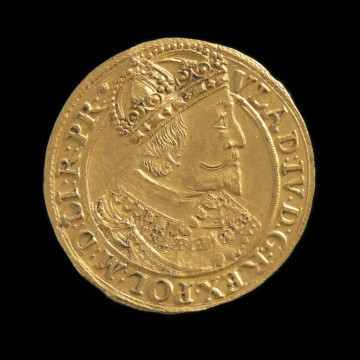
Ducat
1633
National Museum in Szczecin
Part of the collection: Polish coins
In the 17th century Gdańsk was a wealthy city, and due to its importance for the Polish economy, especially for trade in crops and forest products, it was considered one of the most important cities in Poland. That is why the kings of Poland spared no efforts to maintain good relations with the city authorities. Tangible evidence of these relations are the so-called donation coins – impressive and very carefully crafted coins, worth numerous ducats or thalers, which were given as gifts to Polish rulers and dignitaries during their visits to Gdańsk. This is also where the minting of Polish gold coins of the Vasa era took place. This became particularly evident during the reign of King John Casimir Vasa (1609-1672). Even though coins were minted by crown mints, in contrast to the coins from Gdańsk, they made smaller batches, which makes these coins very rare. In the mint of Gdańsk, on the other hand, ducats were mass-produced in 1649-1668. Unlike the Gdańsk donation coins, the local ducat was hardly an attractive coin. It was an ordinary coin, hundreds of which were made every year. This particular ducat was made too shallow, with a worn out stamp, chipped near the rim. Despite its terrible appearance, undoubtedly influenced by the time it spent in circularion, the reverse bears the letters G-R, the signature of Gerhard Rogge, leaseholder of the Gdańsk mint between 1639 and 1656. Danzig ducats were based on the Hungarian rates. This choice was dictated by practical reasons, as the Hungarian ducat had an established position on the European money markets, which made the coin readily accepted. Gold coins with the images of Polish rulers minted in Gdańsk were widely circulated throughout Europe. This is why the Polish gold coins of the Vasa era was often conflated with the coins of Gdańsk.
Mieszko Pawłowski
Other names
Dukat
Author / creator
Dimensions
cały obiekt:
Object type
coin
Technique
minting
Material
gold
Creation time / dating
Creation / finding place
Owner
National Museum in Szczecin
Identification number
Location / status